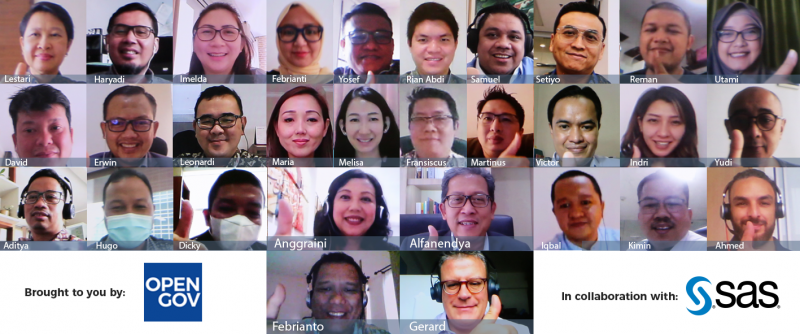
Having battled the global pandemic for more than 6 months and foreseeing its lasting impact in the times to come, it is important to ask how prepared we are for the life after COVID–19. What are some of the valuable lessons that we have learnt in the past few months that we must take with us as we venture into the ‘new normal’?
In an attempt to discover and delve into the answers to these questions, OpenGov Asia hosted an OpenGovLive! Virtual breakfast insight with financial industry executives based in Indonesia.
The timely and thought-provoking issues saw a 100% attendance and high engagement rate from the audience for the session.
Balancing digital transformation along with managing fraud and risk is a major challenge for banks

Mohit Sagar, Group Managing Director and Editor-in-Chief, OpenGov Asia set the tone for the discussion by pointing out that the new, transformed workspace is no longer a physical place that employees go to but a cluster of virtual work tools that lets employees stay productive anytime and anywhere.
This free and flexible style of working has posed a major challenge for the financial sector industry. They are under a lot of pressure to balance their digital transformation efforts with the increasingly stringent regulatory guidelines alongside managing stakeholder expectations.
Apart from being resilient, banks have to constantly ensure that they are compliant and not flouting any regulations to ensure their presence amongst other contemporaries.
Operational resilience, which was earlier a seldom-discussed topic in the boardrooms, has been elevated on the priority list of CIO’s.
Mohit also highlighted the fact that mere compliance is not enough to ensure survival in the post-COVID-19 world. Constantly pushing the envelope by innovating and thinking outside the box is more important than ever.
He left the audience with advice that to effectively manage these distinct aspects of their business, it would be expedient to seek help and support of partners who specialise in it and who can help them prioritise right in the new uncertain normal.
How SAS can help and support financial institutions in the post COVID era

After Mohit’s challenging opening, Anggaraini Rahayu, Director-FSI, SAS Indonesia, shared her insights on the topic.
Anggaraini began by explaining how SAS can support, help respond to sudden changes and mitigate risk for the financial institutions as they recover in the post COVID–era.
She shared that SAS is doing this by identifying the volatility in macroeconomic factors that are key drivers of change, building up data and analytics capabilities along the journey to recovery and getting ahead of the innovation curve and applying analytics for future strategies.
Anggaraini elaborated on the various trends and opportunities in the FSI that have emerged beyond the pandemic. They are enhanced focus on digital transformation, better integration of financial services to the monetary policies, the robustness of asset and liability management, heightened security risks and surge in contactless payments.
She also talked about the way SAS operates in the financial industry space by enabling effective operations and working with innovative solutions that are driving amazing outcomes for their customers. As SAS champions driving value from analytics, she some of their use cases across the financial institution value chain shared with the delegates.
Anggaraini delved into the biggest focus area of SAS I.e. risk management for banking and insurance industry. She shared with the delegates the details of the SAS fraud and security intelligence solutions and how it enables users to stay resilient and relevant in the post-COVID-era.
She concluded her presentation by sharing some successful implementations of the above-mentioned solution.
Speed of service delivery is of utmost importance in the new financial industry world

After Anngarani’s information-rich presentation, Gerard Mcdonnell, Regional Solution Director Fraud & Security Intelligence, SAS came forward to share his perspectives with the audience.
In his very first slide, Gerard highlighted the importance of the speed of delivery in the post-Covid era. Banks and financial institutions are under a lot of pressure to meet the changing demands of their customers in this new world. The need to go digital for financial institutions in the current scenario comes with the downside of increased risk of financial crimes and fraud.
He underscored the need for speed by quoting Klaus Shwab, who said that in this new world it’s not the big fish that eat small fish but the fast fish eating the slow fish.
Gerard validated his statement by citing a recent example where a large European bank lost an opportunity to expand their market due to the lack of agility and velocity in their DNA.
He also echoed the sentiment that the pandemic has only exacerbated the situation for financial institutions forcing the unbanked population to make a leap to digital banking. This, on one hand, has added to the existing challenges for the banks but, on the other, has exposed them to a new customer base that they can tap on.
He went on to shed light on the ways AI can support them. They include accuracy and efficiency with compliance, quick identification of fraudulent transactions, fast and accurate credit scoring.
Gerard strongly advised the colleagues from the industry to embrace the latest advancements in AI to tap on this newly created customer base.
He concluded his presentation by sharing how SAS helped a major bank to significantly improve its fraud management by implementing the fraud management and credit authorisation solution together.
Learning to mitigate the effect of COVID-19 crisis in the financial sector industry

After Gerard, Alfanendya Safudi, Senior Vice President, Head of Credit Portfolio Risk at PT. Bank Mandiri shared his learnings with the delegates.
Alfanendya opened his slot by sharing that, just like the most of delegates and their organisations, Bank Mandiri had very limited visibility of the impact the COVID-19 crisis would have on the economy.
But early stress testing and contingency actions are key to mitigating the impact of COVID–19 outbreak. He ardently advocates stress testing as an effective way of mitigating COVID risk and also emphasised that the test needs to be updated frequently as well as supported by robust tools and systems.
He cautioned the delegates to not rely on a singular stress cycle and undergo multiple rounds of it as they did at Bank Mandiri.
Towards the end of his presentation, Alfanendya shared with the delegates how banks need to prepare as they move forward in the new normal. He also agreed that there is an increase in non-financial risks like fraud, scams, cyber-attacks etc. during the COVID-19 crisis that needs to be better prepared for in times to come.
After the informative presentations, it was now time for the more interactive part of the session: the polling questions and discussions.
On the question about your organisation having the tools to model out the P&L under a wide range of different economic and non-economic scenarios, a majority of the audience voted that they use traditional forecasting techniques, and they are good enough (77%).
One one of the delegated reflected that they are currently using the traditional techniques that are sufficient for now but they are also open to new technologies out there that can help them do it better.
On the question about the impact of the pandemic on their operational risk exposure, particularly relating to fraud and compliance, a major chunk of the delegates voted that increased online and application fraud, along with greater resource demands to keep AML/ KYC/ screening compliance under control have been impacted (50%).

A digital executive shared that increased online or payment fraud and application fraud are bigger impact areas in their organisation that they need to work on.
On the final question about the top priorities, while managing risk management portfolio, the delegates seemed divided between updating their legacy with a modernised risk infrastructure (36%) and using AI and machine learning for credit scoring, capital optimisation, back-testing and model validation and regtech (36%).
After the polling session, the Virtual Breakfast Insight reached a timely conclusion with closing remarks by Febrianto Siboro, Country Managing Director, SAS.
Febrianto began by thanking all the delegates and speakers for joining the session and sharing their insights with the audience. He encouraged the audience to make use of various AI/ML and analytics solutions by SAS to augment their service delivery and team SAS would be happy to entertain their queries and demonstrations for the same.
















